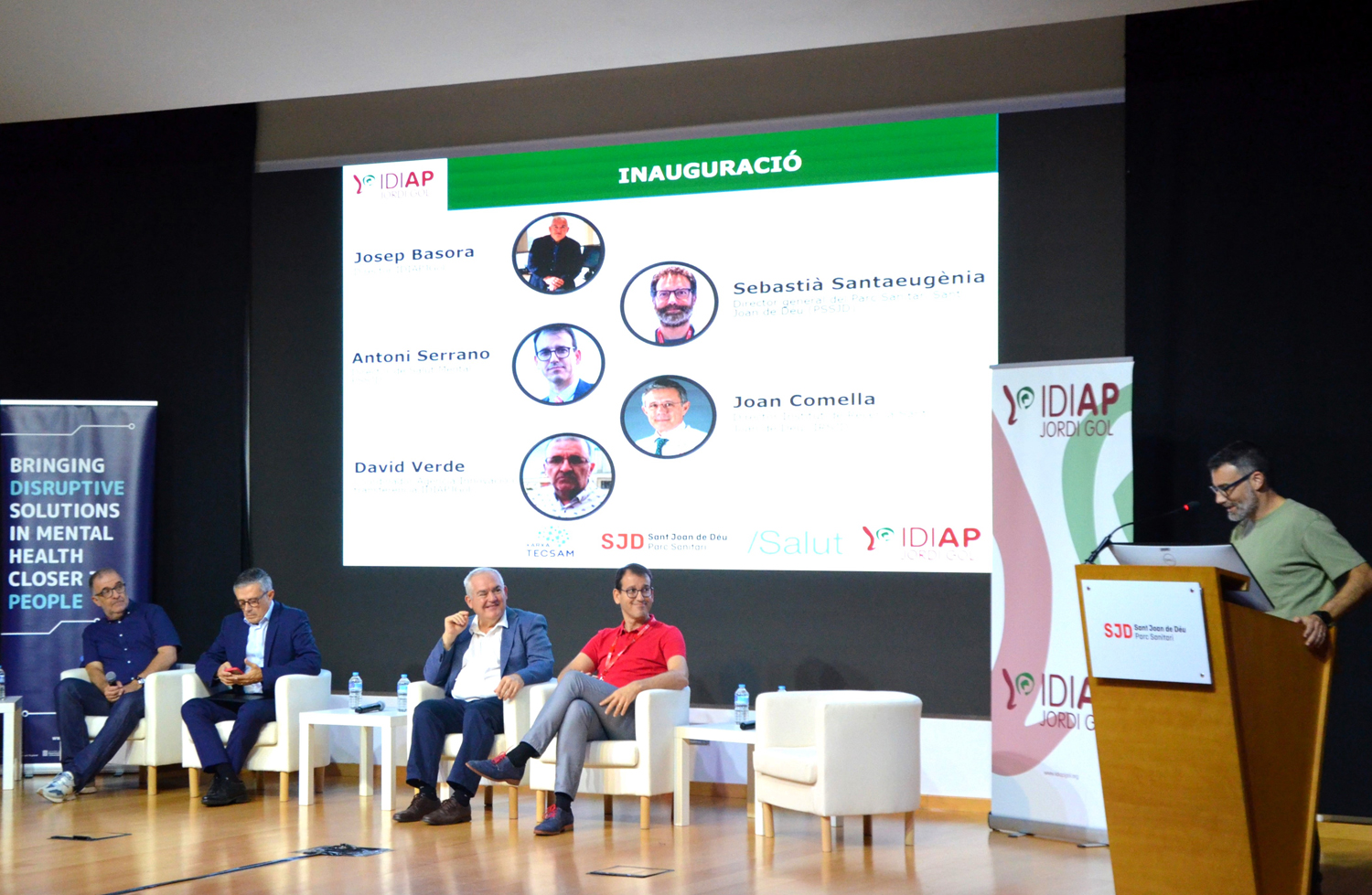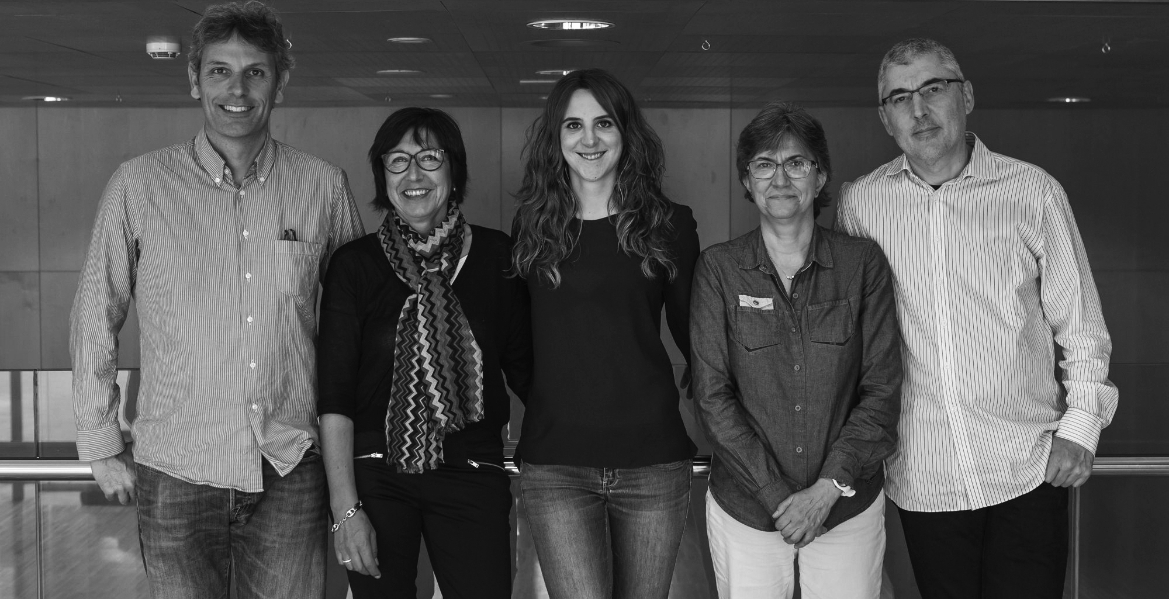
The 5th IDIAPJGol Innovation Conference, held on 23 October 2025 at the Sant Joan de Déu Health Park Auditorium in Sant Boi de Llobregat, focused on innovation aimed at improving mental health care. Researchers, healthcare professionals, and entrepreneurs gathered for this meeting co-organised with the TECSAM Network, of which the IDIAPJGol Mental Health and Primary Care Group is a member. The event sought to strengthen collaboration and promote solutions with a direct impact on people’s lives.
The importance of collaboration
The event opened with institutional greetings from Sebastià Santaeugènia, Managing Director of the Sant Joan de Déu Health Park. This was followed by remarks from Joan Comella, Director of the Sant Joan de Déu Research Institute; Josep Basora, Director of IDIAPJGol; Antoni Serrano, Director of Mental Health at the Sant Joan de Déu Health Park; and David Verde, Coordinator of the IDIAPJGol Innovation Agency.
Comella underlined that innovation and research are the two pillars shaping the future of mental health and praised IDIAPJGol’s role as a benchmark within the Catalan ecosystem. He stressed that innovation goes beyond technology — it involves “taking risks, asking uncomfortable questions, and transforming the future” through collective efforts across institutions and professionals.
Basora highlighted the central role of Primary Care in detecting and supporting people with mental health problems, noting that combating stigma and “breaking down barriers” should guide all innovation efforts.
Finally, Serrano emphasised the social impact of mental health disorders, which will affect one in four people during their lifetime. He argued that innovation only makes sense when it is applied in clinical practice to meet the real needs of patients.
Challenges and opportunities
The roundtable “Mental health and innovation: are we up to the challenge?”, moderated by Marc Casajuana from the IDIAPJGol Innovation Agency, sparked a lively debate on the changes needed in the healthcare system.
Participants included Antònia Raya, nurse researcher with IDIAPJGol’s Mental Health and Primary Care Group; Pilar Vaqué, Director of Primary Care in Lleida (Catalan Health Institute); IDIAPJGol researcher Elena Villabona; Edgar Jorba, CEO of Aimentia; and Judit López, Head of Innovation at the Sant Joan de Déu Health Park and promoter of the TECSAM Network.
The speakers addressed key issues such as fragmented care, lack of professionals and community resources, inequalities in access, and the slow adoption of new solutions. All agreed on the need to prioritise prevention, strengthen coordination between care levels, and ensure a truly person-centred model.
Raya warned about the emotional strain on healthcare professionals and stressed the importance of involving patients and families in addressing mental health problems while reducing overmedicalisation. Villabona called for a bold commitment to social prescribing and community activation. From a technological innovation perspective, Jorba expressed concern that the private sector often benefits from innovative solutions developed in the public sphere, while López highlighted the potential of innovation to improve organisation and reduce waiting lists.
Following the debate, David Verde invited participants to complete a drawing distributed at the entrance, which illustrated either a convergent or divergent approach to innovation, depending on whether the drawing followed a conventional or disruptive style.
Projects demonstrating impact
During the project presentation session, Enric Aragonès discussed the INDI model as an example of organisational innovation. The Head of the IDIAPJGol Mental Health and Primary Care Group and Coordinator of the Tarragona-Reus Research Support Unit reminded attendees that “innovation is only useful if it can be implemented” and that new work habits and clear care models are needed to integrate technology. Aragonès pointed out that “process innovation means changing habits — and that is very difficult.”
Next, Ariadna Mas from Hospital Clínic presented the PRESTO project, an app designed to support patients with mental health issues. Philippe Mortier, researcher at the Hospital del Mar Research Institute, discussed the PERMANENS project, a professional support tool for suicide prevention based on predictive models. Finally, Ignasi Capella, Marketing and Business Development Director at Broomx Technologies, spoke about immersive solutions applied to mental health settings.
Emerging talent
The event also showcased emerging talent through an elevator pitch session, where eight young researchers presented creative proposals to reduce stigma, improve patient follow-up, and expand the use of technological tools in the public health system.
Forward-looking
In their closing remarks, Josep Basora and Judit López thanked all participants for their commitment and engagement, stressing that innovation in mental health is both a shared challenge and an opportunity for transformation.
The final networking cocktail encouraged idea exchange among professionals and fostered new alliances, reaffirming the spirit of a conference that demonstrated that innovation does not advance on its own. It moves forward through collaboration, curiosity, and the conviction that a more humane, accessible, and effective approach to mental health care is possible for everyone.
